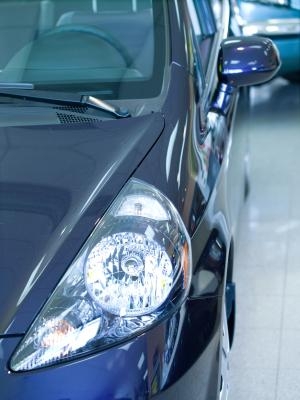
Base coat and clear coat is a painting system used on cars after 1997. It consists of a base color paint and a transparent resin coating to protect it. Some resins require that area to be coated is scuffed, to produce a rough area for the resin to grip onto. This is not true of clear coat.
The base coat/clear coat system describes a way to paint cars. Older cars were painted in just a colored paint. As paint jobs became more complex, with pearl or metallic finishes, these simple paints could not hold up. New paints were developed that added these finishes to a base color paint. A clear coat is added over that paint to protect it. This is called base coat/clear coat, or bc/cc.
Before a car can be painted with bc/cc, it must be sanded, filled and primed. Old paint should be removed, usually by scraping carefully. Any dents should be filled with body putty and sanded smooth. Using a urethane primer will expose any areas that need work, especially with a dark-colored primer. The primer will settle into low spots, leaving the high spots that need sanding a slightly lighter color. You can use multiple layers of primer until you are happy with the car body's smoothness.
The base coat paint is applied after the car is smoothed out during priming. Spray the base on in layers, allowing each layer to dry at least five to ten minutes. This is best done indoors, to reduce dust particles in the paint. Once the last coat is dry, wash the car with soap and water to eliminate grease and fingerprints that can cause the following clear coat to bubble or discolor into "fish-eyes."
Wet-sand the base coat before starting the clear coat. Wet sanding makes the surfaces smoother. It is often a step in polishing cars and other items. If you wet-sand the base coat, wash the vehicle with soap and water after this step, not before. Once the base coat is smooth and clean, start spraying on about three to four layers of clear coat. Do not scuff the base coat beforehand. The clear coat goes on a smooth surface, not a rough one.
The clear coat is meant to protect your car, but it needs some special care at first. Do not wax it or take it through a power car wash for the first thirty days. This gives the solvents and other chemicals in the paints time to dry and evaporate properly. If these chemicals do not evaporate, they can cause bubbles in the paint, and the sanding, smoothing and painting you did could be ruined.